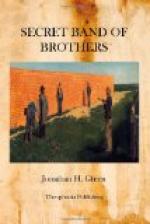Mr. Green denounced bowling-alleys and billiard saloons. He then exposed the tricks by which gamblers cheated, and in doing so interested the audience very much.
Freeman’s rejoinder was still to the end that some gamblers were honest and honourable. He knew that there were rogues among gamblers, who practised tricks, and he gave an excellent specimen of their adroitness, in a trick which Mr. Green acknowledged was a capital one.
The debate was listened to throughout with great attention. It will be resumed on Saturday evening.
THIRD NIGHT
From the Daily Sun.
On Saturday evening, the debate between Messrs. Green and Freeman, on the subject of gambling, was resumed, in the Lecture-room of the Museum building. There was a full audience in attendance, and towards the close of the debate, the proceedings became intensely interesting.
At the appointed hour, Dr. Elder, the moderator, made a few remarks, by way of opening the meeting, and introduced
Mr. Freeman, who, upon advancing to the table, said that he regarded it as complimentary indeed, that he was permitted to proceed with the discussion. Under all the circumstances, he considered it a great compliment, that a highly intelligent audience should listen to one of the proscribed fraternity. But friends, (said the speaker,) if the scene of the discussion lay farther South, in the region of the spot where he was born, he would not consider it so much of a compliment—he would not make such a concession, even from the great Harry of the West down to my fallen foe. In looking round the staging he observed new faces, and missed those who had previously occupied their places—he had heard those men had consulted their dignity, and any man (in the opinion of the speaker) who thinks more of his dignity than his duty is not fit to occupy the sacred desk. The arguments which he had brought forward on the previous occasions have not been answered. Mr. Green has not even attempted to do so, but he (the speaker) had found that a worthy gentleman had entered the field, though not verbally, and endeavoured to supply the place of his opponent. He would take the liberty to compliment him—the distinguished editor of the Post—though he did not know him, nor that such a paper as the Post was printed. That editor, like many others whose prejudices overbalance their reason, had misunderstood him. The speaker then indulged in a critique on the editorial, principally upon the ground which he had taken—that a man has a right to do with his own things what he pleases, provided, in so doing, he does not infringe upon the rights of others. On this point, it appeared that the editor thought and argued differently, and Mr. Freeman said, that in taking the above ground, he did not claim originality, for it is a principle of law, as laid down in Blackstone, Paley, and others—it is the language of great commentators, and upon it he would stand or fall, and leave the distinguished editor to battle with those men.




